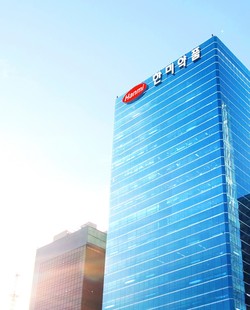Hanmi Pharmaceutical said that Aptose Biosciences, its American partner, has received orphan drug designation (ODD) for HM43239, an acute myeloid leukemia (AML) treatment, from the U.S. Food and Drug Administration.

The company had licensed out the treatment to Aptose in November.
Under the deal, Hanmi received an upfront payment of $12.5 million, including $5 million in cash and $7.5 million in Aptose shares. In addition, Hanmi can receive up to $407.5 million in future milestone payments upon achieving clinical, regulatory, and sales milestones on various indications and royalties according to net sales, the company said.
A Hanmi executive stressed that the FDA's fast-track development designation for HM43239 means that the U.S. food and drug regulator had recognized the potential of HM43239 to meet the unmet needs of AML patients.
"HM43239 is a powerful blood cancer treatment that targets mutations expressed in AML and can overcome resistance to existing treatments," Hanmi Pharmaceutical CEO Kwon Se-chang said. "We will do our best to commercialize it early by closely consulting with Aptose, which has innovative competitiveness in the hematological oncology field, and speeding up the development."
HM43239 inhibits FLT3 mutation (FMS-like tyrosine kinase 3 ITD and TKD) and SYK that causes AML, according to Hanmi.
Therefore, the drug is involved in the proliferation, differentiation, and resistance of myeloid malignancies.
Hanmi added that it had confirmed complete response in HM43239-treated patients who did not respond to existing therapies. In addition, the drug could help overcome drug resistance in patients with intractable blood diseases.
A phase 1/2 clinical trial in relapsed or refractory AML is ongoing in the U.S., and the dose-escalation portion of the study confirmed a potent anti-cancer effect, Hanmi said.
The FDA's orphan drug designation supports the smooth development and approval of treatments for rare and intractable diseases. Once designated as an orphan drug, the drug developers can benefit from reduced the period required for approval and clinical trials, tax credit, and seven years of exclusivity after obtaining authorization.

